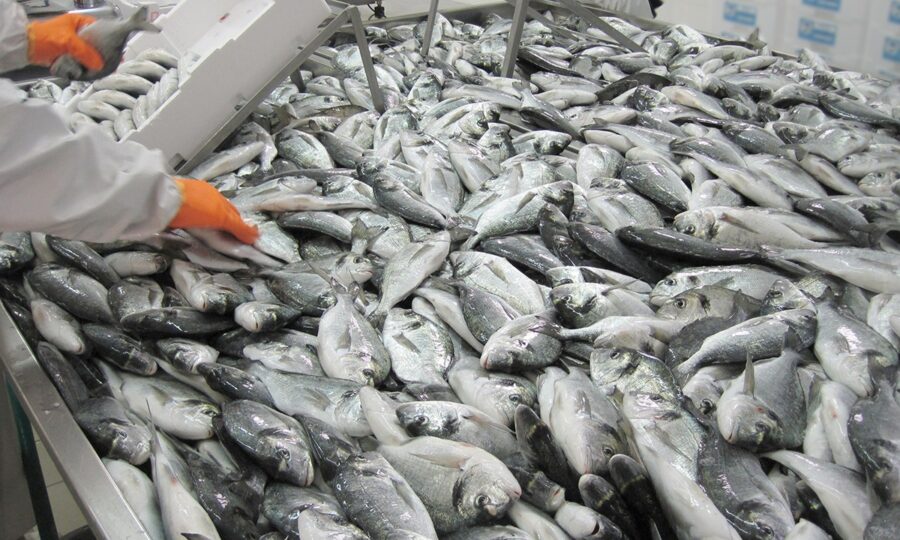The first instalment of the £100m promised to the industry to help it rebuild after Brexit has been announced.
Fishing businesses across the UK will have access to £24m to develop technology, trial new gear and support research to improve the productivity and long-term sustainability of the industry.
The funding to support better science and innovation projects is the first part of the £100m UK Seafood Fund designed to level up coastal communities across the UK, said the UK government.
The total package will ensure that the industry is able to process more fish landed in the UK and create more job opportunities across the supply chain, it says.
The funding will also help to upskill the workforce and train new entrants, as well as investing in technology to put the UK ‘at the cutting edge of new safe and sustainable fishing methods’.
The £100m fund has been divided into three pillars.
The first, the science and innovation pillar that has just been launched, will see the fishing and seafood industry supported to work jointly with scientists to research new types of more productive and sustainable fishing gear, gather new data to more sustainably manage the UK’s fish stocks, and trial projects such as new biodegradable packaging for chilled fish and seafood to reduce single-use plastics.
The science and innovation pillar will also fund the existing UK-wide Seafood Innovation Fund (SIF), which aims to improve the sustainability and productivity of the UK fisheries industry. SIF projects already underway include testing the viability of using solar-powered recharging motors for the UK’s small-scale fleet and reducing single-use plastic by developing biodegradable packaging.
An infrastructure pillar, to be announced later in the autumn, will invest in projects to strengthen the supply chain in the UK. Potential projects include funding for the modernisation of ports, logistic hubs, freezing facilities, improvements to processing plants and new fishmarkets.
A further skills and training pillar will support career opportunities and upskilling in the sector to ensure the industry has the right skills, capacity and expertise. This will be a significant boost for training in the industry, which has often lacked formal routes for training and progression, says the government.
Environment secretary George Eustice said the ‘major investment’ will benefit coastal communities throughout the UK.
“The first investment from our £100m Seafood Fund will boost science and innovation in the fishing industry and, coupled with our Fisheries Act, help us ensure that we have the most sustainable fleet in the world,” he said.
UK government minister for Scotland David Duguid said: “I know from extensive engagement with the Scottish seafood industry that the £100m UK Seafood Fund has been eagerly anticipated, and I welcome the news that the substantial first tranche of funding will boost innovation and all-important sustainability.
“The UK government has been steadfast in support of an industry pivotal to the wellbeing of coastal communities, and we are determined all sectors – catching and processing – should be able to maximise the opportunities now before us.”
He would be working closely with the Scottish seafood and aquaculture sectors ‘to ensure this fresh funding drives the industry to new heights’, he said.
Elspeth Macdonald, chief executive of the SFF, said: “We are pleased to see more details emerge about the £100m fund announced earlier this year by the UK government following the desperately poor outcome for fisheries from the Brexit negotiations.
“We hope that these funds can help the industry build back from the double whammy of Brexit and Covid, and investment in improved fisheries science – ideally with industry much more directly involved – is certainly to be welcomed.
“Once again, however, we see scope for confusion and duplication between UK and Scottish government schemes, and we urge both governments to work together to ensure that as far as Scotland is concerned, these funds are invested where they will have the greatest impact and benefit for Scottish fisheries.”
The NFFO said it was ‘cautious’ about the announcement, as it had doubts about how much the money would benefit vessel owners. Chief executive Barrie Deas said: “On the one hand, £100m is a lot of money. On the other hand, the fishing industry has had repeated experiences where very little of these headline figures filter down to be of actual benefit to fishing vessel operators.
“We are strong supporters of fisheries science partnerships – the NFFO kicked off the first one in 1994 – but as with much in fisheries, the devil is in the detail.”
This story was taken from the latest issue of Fishing News. For more up-to-date and in-depth reports on the UK and Irish commercial fishing sector, subscribe to Fishing News here or buy the latest single issue for just £3.30 here.








